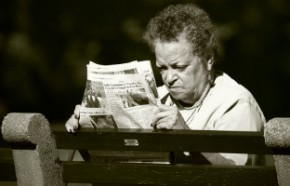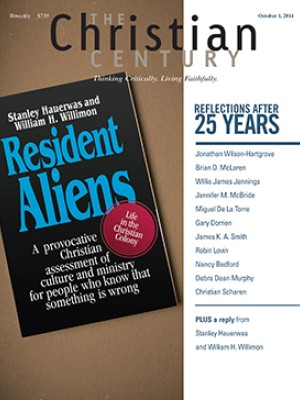To pray the news
Lately there’s been too much death—in faraway places from terrorism, epidemics, hate crimes, honor killings, war; in our own cities from drugs, gang warfare, domestic strife, suicide, arson, accident; and in all places (there is nowhere to hide) from the long list of causes we deem natural. One of our closest friends died in mid-July after a three-year struggle with cancer; we returned from his funeral in England to find that another friend, a 98-year-old nun, had died peacefully the previous day. Our neighbors’ cat died—“He’s up in the sky where God is,” their small daughter told us as she brought us next door to show us not the sky where God is, but the newly dug grave in the backyard. And though the loss of an aged cat weighs comparatively little, this particular loss has planted in an innocent young mind the seed that will one day grow into what some psychologists call “middle knowledge” of the reality of death.
How much of this middle knowledge is good for us? St. Benedict said we should keep death daily before our eyes. But Benedict could scarcely have imagined a time when death would be placed daily before our eyes, not by deep reflection but by shallow projection on flickering screens, gazed at unprepared.
Read our latest issue or browse back issues.
Because these flickering screens are omnipresent, the news of death is never far away. Because I am never far from a computer, I’ve slipped into the habit of reading news aggregators. Not surprisingly, Google News comes up first whenever I Google “news”—and its aggregated content is overwhelmingly about death, death delivered in graphic detail, death awareness in a form that is anything but good for the soul.
A case could be made that—aside from those at the front lines, such as members of the armed forces, police officers, first responders, medical missionaries, journalists at risk, funeral professionals, and end-of-life caregivers—we should ration our exposure to death. Unless our job or calling brings us into daily contact with death and disaster (I cannot presume to advise the real heroes nor claim to understand how they cope), we need to know only enough to enable us to serve in whatever capacity we are capable of serving.
A case could be made that, whatever our job or calling, we would all do better to avoid media that portray our human story as essentially about violence, conflict, and death. For the truism is true: bad news, alarming news, grotesque news, is the news that sells, and when aggregated it loses all sense of proportion. In our local communities and families, if we are lucky enough to live in the world’s pockets of peace and security, we hear news of births as well as deaths with roughly equal interest, even if not in the ratio we would desire. In the media, by contrast, the only births that count are the strange, the celebrated, or the untimely.
There are self-help gurus who advise us to give up reading the news altogether. I read an op-ed recently that listed in attention-grabbing bullet points five reasons why reading the news is bad for one’s health, creativity, mental acuity, and prosperity. But the proposed cure—to ignore the news altogether—strikes me as too extreme, too self-absorbed, and a very poor return to make for the gift of a free press. Assuming we wish to realize in some meaningful way our connection to other human beings on this planet, there has to be a better way.
And I believe there is a better way. Perhaps it is simple common sense, but I find it lived out most fully in monasteries where the sons and daughters of St. Benedict live a life of prayer. With every reading of the Rule, with every meditation on the passion of Christ, with every recitation of the necrology, with the whole daily and yearly round of observances for the dead, monks and nuns are schooled in the remembrance of death. They also read the newspapers, or inform themselves by other means about the catastrophes and cruelties that disfigure our world. Living in hope of the real paradise, they have no wish to inhabit a fool’s paradise. Yet they are equally schooled in the practice of restraint when it comes to the media—which ideally means not dwelling upon horrific details, indulging in mere gossip, or expressing opinions about economic and geopolitical factors that are largely beyond our ken.
The monastic tradition, which has had over 1,500 years to get this right, has a pretty good sense of what it is we really need to know about world affairs—namely, just enough to enable us to pray, to serve, and to grieve within proper measure (not like those who have no hope: 1 Thess. 4:13), without vain curiosity. To pray the news rather than passively to read it—to place oneself within the web of intercession and fellowship where all the news of this fallen world should be aggregated—strikes me as the broad path of sanity and balance, and a sound Christian practice. It’s worth a try, in any case, if the only other options are news-obsession or world-rejection.






